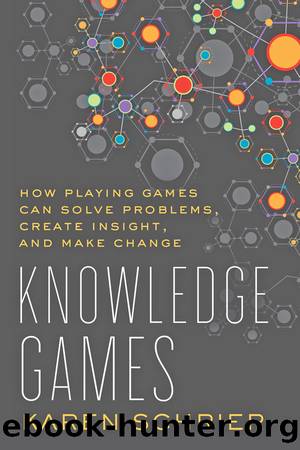Knowledge Games by Karen Schrier

Author:Karen Schrier
Language: eng
Format: epub
ISBN: 9781421419213
Publisher: Johns Hopkins University Press
CHAPTER EIGHT
Data
In Play to Cure: Genes in Space, players whiz through space, plotting the best route for their spacecraft to get as much Element Alpha as possible. Element Alpha does not really exist, but it is a highly sought-after substance in this fictional universe. Element Alpha does have a real-life counterpart, however. It represents actual genetic micro-array data from breast cancer patients managed by Cancer Research UK. Cancer Research UK has a huge backlog of breast cancer data and not enough people to analyze it—it’s just too much for one individual or small team to sift through. A computer cannot process the data because unlike a computer, a human being can quickly identify where the dots of cancer data are denser. By looking at Cancer Research UK’s data set, a player can identify the denser areas that differ from the rest of the data pattern—the anomalies—which helps scientists understand more about breast cancer.1
This is where Play to Cure comes in. According to the lead designer of the game, the player’s “spacecraft is flying ‘over’ a graph that has been rotated 90 degrees, and we are recording the position of the spacecraft in order to analyze the data.”2 The route a player uses to drive her spacecraft in the game shows the scientists where concomitant data densities and anomalies lie in the data. In other words, where the person flies to get more Element Alpha can clue in scientists to the density anomalies in the cancer data. Thus, people are playing a game about space adventure, but they are really analyzing breast cancer data and, by doing so, contributing to our collective knowledge about breast cancer.
What does it mean to produce knowledge through the creation, use, and manipulation of data? Many of the current knowledge games and citizen science projects have centered on generating data, analyzing data, and on solving problems and answering questions through the processing of large amounts of data. In this chapter, I explore the potentials and limits of data, including data collection and analysis, as applied to knowledge games.
What Is Data?
There is a mythology around data, or the “units or morsels of information,” that the more of it we can access and analyze—about ourselves and about each other—the more we will be prepared, ahead, and evolved. In an oft-cited 2008 Wired article, Chris Anderson portended “the end of theory” and the obviation of hypotheses and the scientific method, arguing that we will be able to prove everything and anything if we just have enough data. Models and theories are no longer necessary because they are replaced by a massive amount of information that provide proof without a whiff of doubt.3
Thus, the era of “Big Data” had been heralded. Since then, people have espoused data’s ability to help cure cancer, solve hunger, understand depression, end war, and keep more kids in school. The notion is that if enough data are collected, particularly now that we have access to a wide array of data collectors, such as wireless sensors,
Download
This site does not store any files on its server. We only index and link to content provided by other sites. Please contact the content providers to delete copyright contents if any and email us, we'll remove relevant links or contents immediately.
The Art of Coaching Workbook by Elena Aguilar(51141)
Trainspotting by Irvine Welsh(21614)
Twilight of the Idols With the Antichrist and Ecce Homo by Friedrich Nietzsche(18608)
Fangirl by Rainbow Rowell(9216)
Periodization Training for Sports by Tudor Bompa(8238)
Change Your Questions, Change Your Life by Marilee Adams(7720)
This Is How You Lose Her by Junot Diaz(6859)
Asking the Right Questions: A Guide to Critical Thinking by M. Neil Browne & Stuart M. Keeley(5742)
Grit by Angela Duckworth(5580)
Red Sparrow by Jason Matthews(5452)
Paper Towns by Green John(5165)
Room 212 by Kate Stewart(5093)
Ken Follett - World without end by Ken Follett(4708)
Housekeeping by Marilynne Robinson(4425)
The Sports Rules Book by Human Kinetics(4368)
Double Down (Diary of a Wimpy Kid Book 11) by Jeff Kinney(4253)
Papillon (English) by Henri Charrière(4239)
The Motorcycle Diaries by Ernesto Che Guevara(4075)
Exercise Technique Manual for Resistance Training by National Strength & Conditioning Association(4049)
